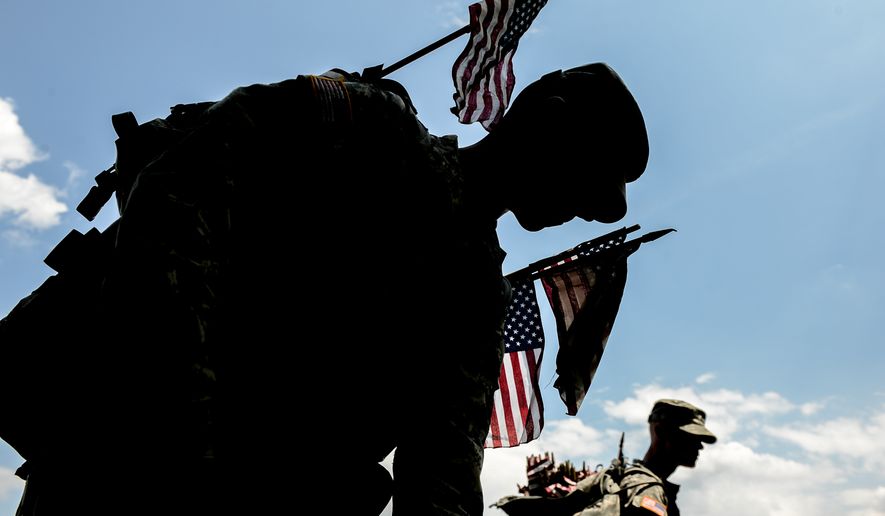Republicans’ calls for a hearing into an extensive backlog of veterans’ requests for records on military burials, employment screening and other matters have been met with silence by the chairwoman of the House Oversight and Reform Committee, Rep. Carolyn Maloney, New York Democrat.
Republicans on the committee requested a hearing this month after the National Personnel Records Center reached a backlog of nearly 500,000 military service-related record requests from veterans and their families.
Its parent agency said late Friday that a resurgence of COVID-19 cases in Missouri, where the main records facility is located, will cause another reduction in on-site staff starting next week. That could lead to even more delays.
The backlog of requests includes military funeral honors, small-business loans, medical claims and other veterans’ benefits.
“It is unacceptable that our service members and their families are experiencing extended delays to receive the benefits they’ve earned,” Rep. Fred Keller, Pennsylvania Republican, told The Washington Times. “My Republican colleagues and I on the Oversight and Reform Committee will continue urging Chairwoman Maloney to schedule an immediate hearing to conduct proper oversight on the NPRC’s efforts to eliminate the present backlog.”
Ms. Maloney has not responded to the hearing request, committee Republican staff said, and no hearing has been scheduled.
A staff member familiar with the hearing request said the committee could schedule a hearing but Democrats, who control the committee’s schedule, are not prioritizing it.
The committee’s majority staff did not immediately respond to The Times’ request for comment.
The records backlog grew last year as a result of COVID-19 on-site staffing restrictions at the St. Louis records facility, which holds “more than 2 million cubic feet of military personnel and medical records,” according to a statement by the National Archives Records Administration, the NPRC’s parent agency.
Most of the records are in hard copy form only and cannot be accessed electronically. The NPRC restricted onsite staffing in March 2020, when the COVID-19 pandemic was declared, leaving many veterans unable to request benefits.
The NPRC, which receives more than 1.2 million record requests per year, increased its onsite staffing to just 25% as of March.
Figures show the NPRC responded to 288,000 requests from March 2020 to March 2021. Of the requests, 45,000 were for burials, 7,500 for homeless veterans and 18,000 for medical emergencies. More than 116,000 of the requests were deemed urgent.
In a letter to Archivist of the United States David Ferriero, Mr. Keller and several of his Republican colleagues wrote that families were waiting for weeks to bury loved ones or file claims with the Department of Veterans Affairs because of the backlog.
Others were unable to access copies for their separation paperwork, needed to prove for employment purposes that they had separated from the service honorably.
“It is troubling that the government is failing those who sacrificed for the country,” the lawmakers wrote. “It is inexcusable that we are now unable to even provide them with paperwork documenting their service.”
Mr. Ferriero wrote to members of the oversight committee last week to confirm that the NPRC had recalled all staff who are not on COVID-19 reasonable accommodation and said the agency is increasing staff to exceed pre-pandemic levels.
The letter also details steps the NPRC has taken to digitize records and streamline the request process. The NPRC aims to clear the backlog by the end of next year.
But a National Archives Records Administration statement released Friday said “deteriorating local health conditions” are again forcing on-site staff reductions. The coronavirus is surging in Missouri, where about 40% of the state’s adults have been vaccinated.
“The conditions have continued to worsen, causing us to regress to Phase 1, effective Monday,” the statement reads. “This means that only 20 percent of our staff can work on site at any one time. We will continue working in two shifts daily, including weekends, and we will also continue to use our expanded capability to process requests remotely. We are closely monitoring local health conditions and will enter post-pandemic operations as soon as it is safe to do so.”
Mr. Keller, who has called for a solution to the backlog since November, told The Times that his “focus remains on seeing results.”
Mr. Keller introduced legislation in June that would require the NPRC to report to Congress on its progress in clearing the backlog. The bill, known as the Records Act, has 50 co-sponsors.
The committee held a bipartisan briefing with the National Archives Records Administration in June, but Mr. Keller said a public hearing is needed to track progress on the backlog and to provide congressional oversight to ensure the NPRC is prepared to address interruptions in the future.
“We cannot allow this sort of thing to happen again, which is why the Records Act is more important than ever in providing for an official examination of the NPRC’s procedures,” Mr. Keller told The Times.
• Joseph Clark can be reached at jclark@washingtontimes.com.




Please read our comment policy before commenting.